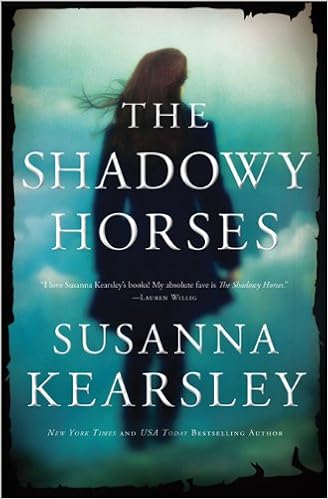The Shadowy Horses

by Susanna Kearsley
My mom was an avid reader - between her and my father, who read his way from A to Z in our encyclopedia (skipping not one entry), I assumed that reading was simply something you did, like breathing or eating, and often in place of sleeping.
As she grew older mom's taste in literature went from the more highbrow to simply reading for pleasure, and she developed a couple of particular interests: mysteries (especially cozy series), and Scotland. So a mystery set in Scotland was a perfect choice. Inevitably, there would be one or more such books on her bedside table, or near her place at the table, carefully bookmarked and often read more than once.
When she moved from her larger home into a smaller apartment, she took many of her favorites with her, but my sister and I inherited boxes and boxes of those she had no room for. Hunting for something not too challenging to read on a recent trip, I found "The Shadowy Horses," and simply stuffed it into my carry-on bag without much thought.
It turned out to be a far more fun read that I could have expected.
"The Shadowy Horses" is taken from a line in a Yeats' poem "He Bids His Beloved Be At Peace." Now, Yeats is another favorite of mine, along with horses, so it may not have been quite as accidental a find as I thought, my subconscious perhaps leading the way. And as it turns out, the book centers around an archaeological dig (yes, like most girls who are horse lovers, I also went through my archaeology period) searching for the mythical Ninth Legion of Rome, that disappeared into the mists of time and Caledonia (Scotland), around 109 A.D.
I had actually also read a couple of books that dealt with this persistent mystery - there was a Ninth Legion, and it did disappear without a trace somewhere in the borderlands of Scotland.
The heroine of the book is a feisty, intelligent, bookish but still passionate young woman named Verity Grey. She is surrounded by the requisite number of men: an older, wiser mentor (to whom she is attracted, at least intellectually); a handsome, clever, dangerous man with whom she has had an affaire de coeur but whom she now no longer trusts; a rough-about-the-edges but educated Scotsman who is both a scholar and a local. And a ghostly presence a young local boy with a sixth sense calls "The Sentinel."
Like most books of its genre, this one is full of little details that give the genre the name "cozy:" what was had for dinner, the changes in weather, the chatty housekeeper, the confused emotions and tangled conversations. And while this isn't a murder mystery, there are a number of mysteries to be solved, not the least of which is who is The Sentinel, and what does he want? And with whom will Verity end up, if anyone? And does the team find the Ninth? And who is the one trying to throw a monkey wrench into the dig's progress, and why?
The writing is solid; the knowledge of Scotland (and Scots dialect) is excellent (and not over-done, thank goodness!), and the characters are strong without being annoying. Even the rather abrupt reveal at the end isn't too contrived to be believed, and satisfies both the story and the reader.
It's not a new book (published 1997); but it's one I'll keep on my bookshelf to perhaps pull out some chilly evening for entertainment, and to remind me of my mom doing the same. That's what a good cozy mystery is for, after all.
And for your reference, the Yeats' poem:
I hear the Shadowy Horses, their long manes a-shake,
Their hoofs heavy with tumult, their eyes glimmering white;
The North unfolds above them clinging, creeping night,
The East her hidden joy before the morning break,
The West weeps in pale dew and sighs passing away,
The South is pouring down roses of crimson fire:
O vanity of Sleep, Hope, Dream, endless Desire,
The Horses of Disaster plunge in the heavy clay:
Beloved, let your eyes half close, and your heart beat
Over my heart, and your hair fall over my breast,
Drowning love's lonely hour in deep twilight of rest,
And hiding their tossing manes and their tumultuous feet.
--William Butler Yeats, 1896

Comments